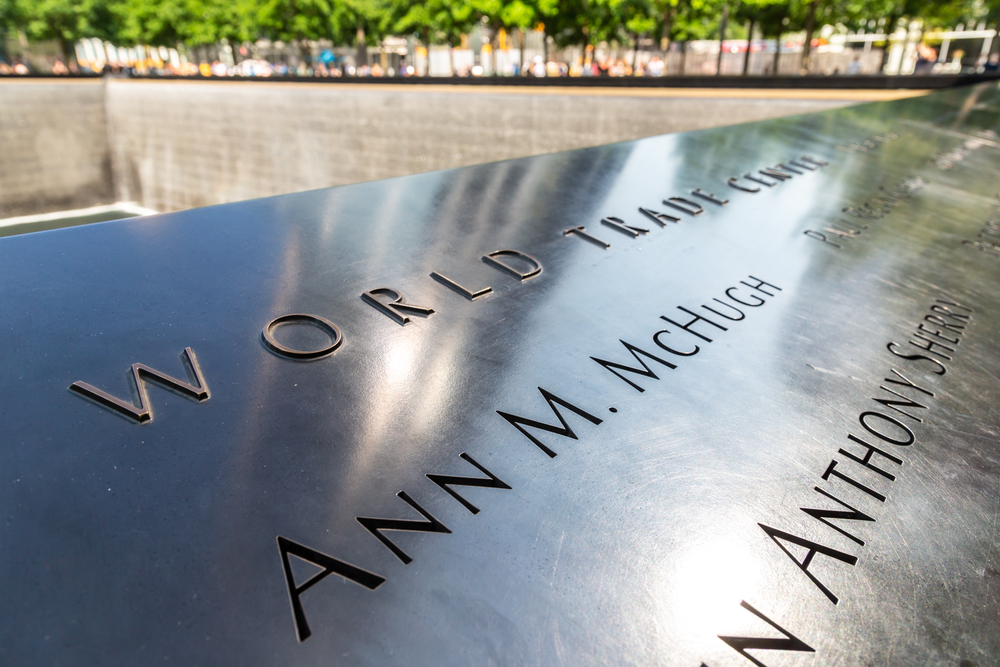It’s been 20 years since the national tragedy of September 11. As a nation, many commemorate the day every year as a national day of remembrance and service. This year, there will be many tributes and remembrances. For many people, memorials and remembrances are a comforting ritual, one of healing. We’ve compiled several resources on memorials, as well as information on grief and mourning for those who feel the loss of a loved one. These can be helpful to anyone. But remember – we all process grief and trauma differently, be kind to yourself and others. If you find remembrances too painful, spend time in other activities or with people you love to keep your exposure low. Avoid social media. Skip the news for a few days.
For those of us who were adults in 2001, it was an unforgettable day and series of events. In addition to the personal loss experienced by survivors, the bereaved, and the affected communities, as a nation we experienced shared grief. As time progresses, younger generations may not have the same emotional stake in events. Most Millennials were between the ages of 5 and 20, so memories may vary in intensity and clarity. And for a whole new generation – Gen Z – historical records or oral histories from family members are the only associations. In fact, many children of victims were too young to have clear memories: They Don’t Remember Their Parents Dying On 9/11. But They’ll Never Forget.
In addition to the tragedy, the sadness, the horror and the grief, there was another notable thing that characterized events: Bravery. Heroism. Kindness. Generosity. Selflessness. Helping one another. Whether on the ground at the scene of the tragedies or far afield, we united as a people. Race, religion, ethnicity, political parties – none of these things mattered at the time. And as a nation, we were embraced by the world.
Long term or complicated grief
Everybody deals with grief, loss, and tragedies differently. It’s difficult to know what “normal” grieving is because no one processes grief quite the same way and no one is on the same schedule. There are so many factors that might influence the process: our closeness to the deceased and the day-to-day impact on our lives; the circumstances of the death, such as if it was sudden and traumatic event or a prolonged illness; or if the deceased was a child or an older person who lived a long, full life.
People who suffer in disasters, wars, gun violence, and natural catastrophes often experience something called “long term grief,” “complicated grief,” or “post traumatic stress disorder (PTSD).” When grief continues to disrupt activities of daily life long after the loss has occurred, a person may be experiencing something commonly referred to as unresolved grief. This is a form of depression and the person who experiences this long-lasting grief should seek professional assistance. Potential symptoms of complicated grief include:
Nightmares, flashbacks, sleep disruption • Feelings of hopelessness, despair, meaninglessness • Intense feelings of guilt, blame or worthlessness • Physical distress or illness • Extreme anger • Ongoing disinterest in life • Inability to perform normal daily activities • Isolation and breaking social ties • Thoughts of suicide • Escape behaviors such as increased use of alcohol or drugs.
When grief remains unresolved or results in significant life disruption due to prolonged sadness, professional assistance can help. Remember, if you or a family member faces grief or loss, you can call your EAP 24-7 for counseling and support. Coping with grief is one of the most common reasons people turn to their EAP.
Commemorations and Memorials
- 9-11 20th Anniversary Commemoration
- National September 11 Memorial and Museum – see also: Learn and explore from home
- National 9-11 Pentagon Memorial
- Flight 93 National Memorial
Resources for dealing with complicated or long term grief and PTSD
- The American Academy of Bereavement: Dealing With Long Term Grief
- Mayo Clinic: Complicated Grief
- What are the signs of complicated grief disorder
- National Institute of Mental Health: Post-Traumatic Stress Disorder
- Medline: Post-Traumatic Stress Disorder
- Mayo Clinic: Post-traumatic stress disorder (PTSD)
- First Responders – Stress & Grief in the Aftermath of Crises
- Grief in the workplace: Tips for supervisors
- Coping with violence and trauma
Other healing resources
- Tuesday’s Children – provides a lifetime of healing for families who have been forever changed by terrorism, military conflict or mass violence.
- Voices Center for Resilience – provides long-term support and resources that promote mental health care and wellness, for victims’ families, responders, survivors, and families of those who have died of 9/11 related illnesses; and assists communities in preparing for and recovering from tragedy.
- 9-11 World Trade Center Health Program
- The World Trade Center Survivors’ Network
- September 11th Victim Compensation Fund (VCF)
More 9-11 historical documents
- 17 new 9/11 documentaries to commemorate 20th anniversary
- Come From Away – a heartwarming Broadway play and soon-to-be-film about a small Canadian town that hosted 7,000 stranded travelers when 38 US planes were diverted as airports shut down. It’s been called “a cathartic reminder of the capacity for human kindness in even the darkest of times and the triumph of humanity over hate.”
- The 9/11 Memorial Museum’s oral history collection – documents the history of 9/11 through recorded interviews with responders, survivors, 9/11 family members, and others deeply affected by the attacks at the World Trade Center, the Pentagon, and near Shanksville, Pennsylvania.
- 9-11 survivor and witness stories – a collection of oral history videos from survivors, family members, and witnesses telling what they experienced and how they have coped with events over the years.

